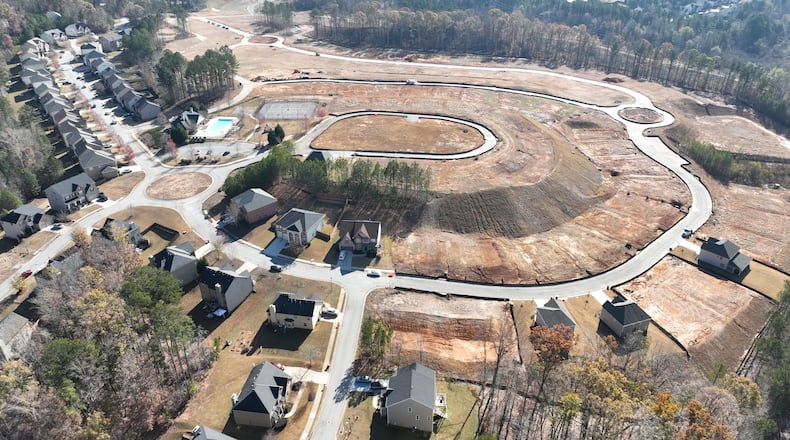A panel of Georgia Court of Appeals judges has kicked a legal challenge to build-to-rent development in the city of South Fulton back to a trial court, likely leaving the case in doubt for months or more.
At issue is whether a real estate company has the right to build dozens of smaller houses for the purpose of renting within Parkview Estates, an existing subdivision that started out as owner-occupied homes.
The trial court had originally found that the builder, Atlanta-based ResiBuilt, had the right to put up the homes. But the panel of three appeals court judges said there wasn’t enough explanation of the decision and ordered the trial court to provide more analysis.
The case, involving property in the Parkview Estates subdivision, was filed in June by the city, which intended to prevent ResiBuilt from constructing more than 50 rentals.
In February, The Atlanta Journal-Constitution published American Dream for Rent, an investigative series that found large investment firms have acquired tens of thousands of homes across the region and converted them to rentals. Some large firms were building new homes for that purpose. The AJC analysis found that Wall Street investors are pushing homeownership out of reach for many first-time buyers.
Investors have focused much of their buying in African American communities, pricing out families, many of whom wind up renting from these same firms and face deplorable conditions, exorbitant fees and frequent evictions.
The investor purchases, while a modest part of the overall market, are often concentrated in smaller areas where they have an outsized impact, the AJC investigation showed.
One neighborhood featured in the series was Parkview Estates. Homeowners in the neighborhood first fought ResiBuilt’s plans before the city sued.
The South Fulton dispute had its origins in the heady days of the housing boom. A local builder put up a handful of homes at Parkview Estates, long before South Fulton was incorporated as a city.
Most of the homes were sold but some were rented.
But after the housing market crashed, construction in the subdivision stopped.
Credit: HYOSUB SHIN / AJC
Credit: HYOSUB SHIN / AJC
In 2021, ResiBuilt purchased the property, including 134 lots, for $4.65 million, according to the Ackerman/Pioneer Land Advisory Group, which brokered the sale. A little less than half of them were developed and ready for construction, Ackerman/Pioneer said.
Under Fulton County law — which had been in force until the city of South Fulton was incorporated in 2017 — there was no ban on build-to-rent.
ResiBuilt had some building permits from the county dating back to the original builder and believed its right to build was protected by the Fulton laws that it had been operating under. But the newly incorporated city of South Fulton passed an ordinance prohibiting the construction of homes that would be rented out.
The city, maintaining that ResiBuilt’s permits were no longer valid, rescinded the permits and sued ResiBuilt.
Last fall, city officials told the AJC that the new rule was intended to protect homeowners. Officials of South Fulton have not responded in recent weeks to repeated requests for comment made by the AJC.
ResiBuilt has argued that its plans had been made when the county law was in force, so it was not subject to the new city’s ban.
“There were building permits issued and at some point, the mayor wakes up and shuts off the building permits,” said Simon Bloom, attorney for ResiBuilt. The (trial) court found our rights had vested and ordered the city to issue building permits.”
But the city appealed.
Now, the appeals court panel hasn’t disagreed with the trial court’s conclusion, but it has asked for more legal back-up, Bloom said. “The appeals court said, ‘We hear you, but you didn’t do much analysis. You need to elaborate.’”
Even so, the appeals court judges did not require the trial court to reach the same conclusion it did the first time, he said. “That is still kind of TBD.”
Meanwhile, ResiBuilt has hired contractors in recent months to sculpt the undeveloped land and build roadways through the property. And some homeowners, who had cheered the city’s efforts to stop build-to-rent, have said they fear that if construction of rental properties is approved, it will undermine the value of their homes.
Moreover, they said when ResiBuilt bought the land, it took control of the neighborhood association and, in apparent retaliation for criticism, it has not maintained community amenities, with the pool padlocked and basketball and tennis courts falling into disrepair.
So the current uncertainty is at least a temporary triumph since it further delays construction, said Pernell Evans, a long-time homeowner at Parkview.
“As homeowners, we are very happy with the decision because if it ruled in favor of ResiBuilt, it was game over for us,” he said. “And if the trial court now decides to stick with the appeals decision and leave the case vacated, ResiBuilt has to start all over.”
For the company, the long delay in its plans have cost money, so if ResiBuilt wins in the second go-round at the trial court, it will ask for significant damages, Bloom said.
In the meantime, the company and its critics are awaiting the trial court’s decision and it’s likely that whoever loses will take the case back to the appeals’ court, which means the issue will not be resolved for a while.
Yet the stakes are larger than that, since the decision could affect construction plans of many developers across the state who want to build rentals.
“Should the city or the county be allowed to tell you what you can and what you cannot do with your property?” Bloom asked. “That is what this is all about.”
About the Author
The Latest
Featured




